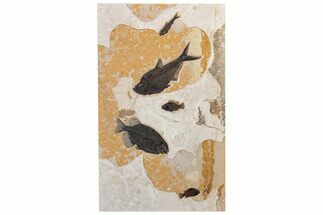This Specimen has been sold.
Framed Priscacara Fossil Fish - 4.2"
This is a very artistically framed example of the fossil fish Cockerellites liops. It was quarried from the Green River Formation of Wyoming and would be approximately 45-50 million years old. The fish comes from the "18 inch" layer which produces darker and more detailed specimens than the split fish layers. This specimen is of exceptional quality and the matrix has been shaped, backed by slate and mounted in a wood frame ready to be hung on a wall.
A true, prehistoric work of art.
A true, prehistoric work of art.
Cockerellites liops is a species of extinct temperate bass found in the Eocene aged Green River Formation of Wyoming. It is characterized by a sunfish-like body and its stout dorsal and anal spines. It was originally placed in the Priscacara genus but was moved to the newly created genus Cockerellites by D. Jordan and H. Hanibal in 1923. There is still some debate among researchers about whether this new genus is valid.
Cockerellites is found in large numbers in mid-lake deposits, representing 5 to 20 percent of the fish unearthed, depending on the layer. It is considerably rarer in shoreline deposits, representing only 1 to 2 percent of the fish found. Because of this, Cockerellites is thought to have been a schooling fish. Fossils have been found at a maximum size of about six inches, but they rarely exceed five inches in length.
At first glance, Cockerellites liops has a very similar appearance to the rarer species Priscacara. Size can often be used as a differentiator, since Cockerellites did not exceed 6 inches while Priscacara serrata is typically found in excess of 6 inches. Cockerellites also has more dorsal and anal fin rays than Priscacara and a much smaller mouth.
Cockerellites is found in large numbers in mid-lake deposits, representing 5 to 20 percent of the fish unearthed, depending on the layer. It is considerably rarer in shoreline deposits, representing only 1 to 2 percent of the fish found. Because of this, Cockerellites is thought to have been a schooling fish. Fossils have been found at a maximum size of about six inches, but they rarely exceed five inches in length.
At first glance, Cockerellites liops has a very similar appearance to the rarer species Priscacara. Size can often be used as a differentiator, since Cockerellites did not exceed 6 inches while Priscacara serrata is typically found in excess of 6 inches. Cockerellites also has more dorsal and anal fin rays than Priscacara and a much smaller mouth.
SPECIES
Cockerellites liops
LOCATION
Kemmerer, Wyoming
FORMATION
Green River Formation
SIZE
4.2" long, frame 12x9.6"
CATEGORY
SUB CATEGORY
ITEM
#8792
We guarantee the authenticity of all of our specimens.
 Reviews
Reviews














